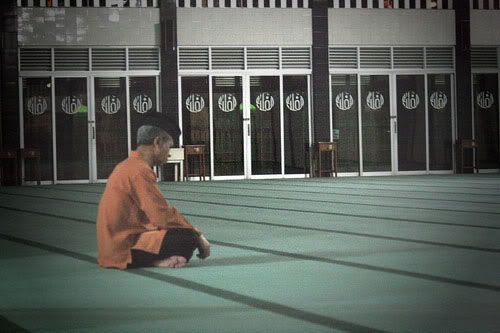Learn How to Perform this Sunnah of the Prophet
I'tikaf or Seclusion in the Mosque is to stick to something whether good or bad and to block everything else out of your life. A time for Allah only.
I'tikaf is seclusion in the Mosque for the pure pleasure of Allah. The only reason one leaves is to relieve one self or to perform wudu (washing for the prayer.) It is allowed to leave the Mosque for food and drink also, but it is preferred not to.
I'tikaf is sunnah of the Prophet and it is something that everyone should perform during Ramadan. Prophet Mohammad (peace be upon him) use to perform I'tikaf with his wives and companions in the Mosque. It should be pointed out that there is no sound hadith about the merits of I'tikaf.
The proof for this (I'tikaf) is in the hadîth related by Aiesha where she says that the Prophet (peace be upon him) used to lean his head out of the mosque while he was observing i`tikâf and she would comb his hair. [Sahîh al-Bukhari (2046)]
Prophet Mohammad (peace be upon him) use to perform I'tikaf 10 days a year and on the year he died he performed 20 days of seclusion.
Intention
By saying the oath: "Oh Allah, I must make I'tikaf," this is a obligatory oath. A conditional oath is, "If Allah cures me, I will make I'tikaf." It is simple enough to say only this.
Length of I'tikaf
There is no set time or requirement. I'tikaf could be from Magrid to Isha prayer or for as long as the Muslim decides. The sunnah has no specific time and one should look only at how the Prophet (peace be upon him) performed his I'tikaf.
Conditions of I'itkaf
The person performing I'tikaf must be a Muslim adult, a discerning child who is free of sexual defilement or an adolescent who is free of menstrual or childbirth bleeding.
Principals of I'tikaf
I'tikaf will be fullfilled if a person stays in the Mosque to become closer to Allah. If the person is not in the Mosque and did this not for the pleasure of Allah, it is not I'tikaf. Intention is the first requirement.
The beginning and ending
There is no specific time to begin I'tikaf, so it depends on the intention and the oath. The I'tikaf ends when one leaves the Mosque. This meaning other than to go to the bathroom or eat and drink. If one intends to begin I'tikaf, it should be before sunset.
What Acts of Worship are preferred
The person performing I'itkaf should remain busy with the work of Allah, such as reading Quran, doing zikr, praying, making dua (supplications), asking for forgiveness, sending blessings on Prophet Mohammad (peace be upon him). Included in these practices are reading the hadiths (ways of the Prophet) and books of tafsir (explanations of the Quran.)
It is disliked for the Muslim to concern himself with what is not his business and to engage in idle talking.
Acts that Nullify the I'tikaf
- Leaving the Mosque intentionally without a need.
- Abandoning belief in Islam.
- Becoming Insane or drunk or the start of one's period.
- Having sexual intercourse.
If for some reason the Muslim must break his I'tikaf, they may make it up later., some say it is obligatory.
I'itkaf is both a blessed time and a religious time. I'tikaf protects the Muslim from the hellfire and it is also following the sunnah (ways) of our Prophet (peace be upon him). I'tikaf can be performed for as little as a time between magrid prayers and isha prayers or for many days.
As many men flock to the Mosque to please Allah, they are remaining to do I'tikaf. There should be no talking about ordinary life subjects. The only subject to talk about in the true Islam is the deen (faith) ,the jannah (heaven) and our most beloved Prophet (peace be upon him).
* Muslims invoke Allah's blessings on the Prophet Muhammad whenever this name is mentioned.
Photo Courtesy of PhotoBucket: hanandiko

